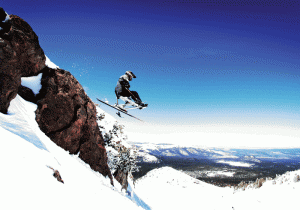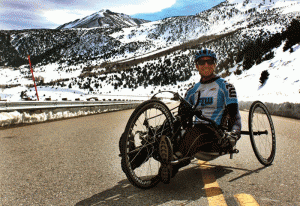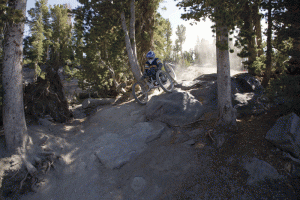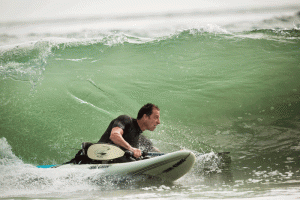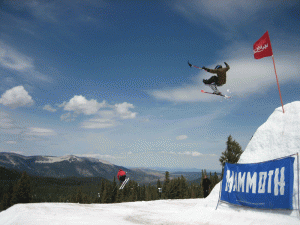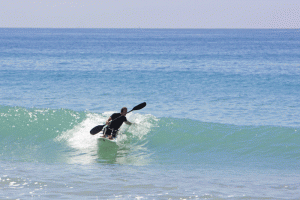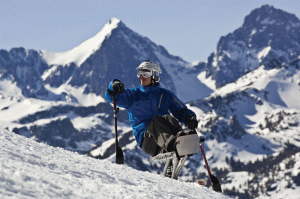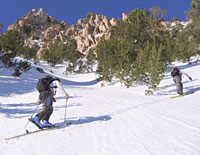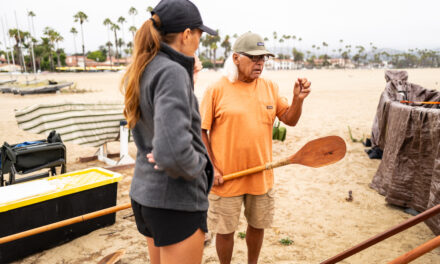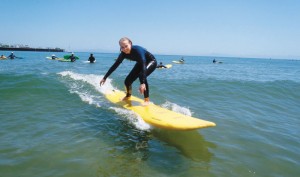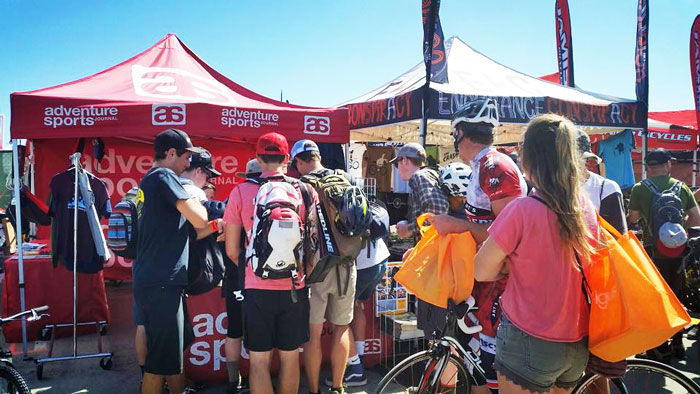- Tahoe’s Nevada Beach Tops the List of Hard-to-Book Campgrounds - 07/17/2024
- Cannabis Watershed Protection Program Cleans Up Illegal Grow Sites - 07/10/2024
- French Fire - 07/05/2024
By Leonie Sherman
In many ways Jeremy McGhee is your standard California surf-ski bum. He’s got sun-streaked tousled hair and an infectious grin. He lives in a converted garage on the beach at Cardiff-by-the- Sea, where he surfs four times a week. Two years ago he completed an epic ski descent of Bloody Couloir that he’s still grinning about.
But Jeremy McGhee can’t walk. When he surfs he has to drag himself across the sand and he sits on top of his board. When he skis it’s in a modified wheelchair called a sitski.
Twelve years ago a car plowed into the motorcycle he was riding. His journey from stoked 25-year-old kid to stoked 37-year-old man is the story of how the most brutal tragedy can become an opportunity. But it’s mostly the tale of two brothers and how love conquers all.
The world turned upside down
In 2002 Jeremy was working seasonally as a lifeguard and a snowboard instructor. “I was racing boarder cross, loving motorcycles, and developing my snowboarding career,” Jeremy says with a sly grin. “Man, I was living the life.”
All that changed in an instant, when the car hit him. “I was completely aware the whole time. The vision that sticks with me is the side mirror smashing up against my face. The next thing I knew I was in the street.”
As a lifeguard, Jeremy was familiar with emergency situations and immediately began assessing his injuries.
“The first thing I realized was I could not get up, so I figured I had broken my back. It was painful to breathe so I guessed I must have broken ribs. Then I tasted blood, so one or both of my lungs was probably punctured. Then my hands and face got really cold and I got really tired so I figured I must have been losing a lot of blood.”
A group of paramedics on break at a taco shop across the street watched the accident unfold. They dropped their food, got their ambulance and rushed Jeremy to the hospital. Twenty-two minutes later he was in surgery. “Those guys saved my life,” Jeremy says, shaking his head.
The healing process
Jeremy’s first couple of weeks in the ICU were, well, intense. Fierce pain, beeping machines, nurses waking him every few hours, IV tubes and more pain.
Jeremy recalls, “By the time I got out of the hospital, the pain had subsided, but I still had a broken back and broken ribs. At first I went back to my apartment, but healing up from something like that all by yourself is pretty arduous.”
Nothing brings a family together like a catastrophic accident. Even though Jeremy wasn’t that close with his mom or his younger brother Bryan – his dad was long gone – within months they were all sharing the house they grew up in again.
“The only way my mom could afford to take care of me was if I paid her rent,” Jeremy explains. “I was getting disability money from the state, so that was fine. But pretty soon I realized I might as well give the money straight to my brother’s drug dealer, because she was giving him the cash and he was using it to buy meth.”
Jeremy told his mom she had to kick Bryan out or he was going to stop paying her rent. She didn’t talk to him for three months.
“She was pissed and scared and couldn’t afford to live there without my help,” Jeremy says. “So eventually she kicked Bryan out.”
We’ve all heard about the moment an addict hits rock bottom and there’s nowhere to go but up. For Jeremy’s brother Bryan that moment came when his mom told him he had to leave the house. He blamed Jeremy and hit him so hard that he fell out of his wheelchair and crashed into a nearby wall.
Their mother called the cops and as Jeremy nursed his bruises he watched his brother being wrestled to the ground by two police officers. “I forgave him that instant,” Jeremy says simply.
“I mean, how pathetic do you have to be to beat up your older brother while he’s in a wheelchair?” Jeremy wonders out loud. “But that’s the day he started to get better.”
A tale of two brothers
Jeremy is only 14 months older than Bryan. “You take two kids that close in age, put them in a closet hiding from their abusive father, and they get real close,” Jeremy says.
In high school, Bryan was the quarterback for the JV football team as a freshman, got recruited to the varsity team towards the end of his first season and earned straight A’s. He was voted the most desirable guy in his class.
But towards the end of his sophomore year, he was goofing around with some friends and decided to “surf” the bed of a speeding pick up truck, when he was thrown out of the moving vehicle. In that fateful moment, he got demoted from straight A student to catatonic hospital patient. Jeremy, who was a junior at the time, dropped out of school so he could live at his brother’s bedside. “I just had to be there with him,” Jeremy explains.
“When someone wakes up from a coma in the movies, they open their eyes, squeeze your hand and tell you they love you,” Jeremy says with a low chuckle. ”Real life isn’t like that at all.”
Bryan was unconscious about six weeks before he woke up. A few weeks later he could write simple words on a pad, and about a month after that he began taking his first steps.
“Nursing him back to health was crazy,” Jeremy recalls. “I remember helping him pee, teaching him how to count change and put it in a coke machine, teaching him to use utensils again, helping him into the shower, and cleaning him up when he shit himself.”
The bulk of Bryan’s recovery took place in a residential rehabilitation facility. “The rehab was really strict about visitors, they didn’t want a bunch of people there and we didn’t know any better so we went along with it,” Jeremy says ruefully. “So I went back and finished my senior year in high school, and then I went away to college.”
Meanwhile Bryan was attending Special Education classes and being dressed by his mother. A longer slide down the high school social ladder is difficult to imagine. Bryan remembered the athletic straight A student he had been while he grappled with his present reality.
“On one of my first visits home from college, Bryan asked me if I knew how to get weed, and I was like, ‘Why do you want weed for?’ I didn’t even get it,” Jeremy recalls. “He just wanted to be cool again.”
Marijuana is not a gateway drug for many users, but it was for Bryan. He graduated from pot to meth and pretty soon he became a full-on tweaker.
“He went from being the quarterback to picking his face, teeth falling out of his head and hanging out with the shadiest people. It happened so fast,” Jeremy says. “Crystal meth is the ugliest thing on earth.”
Unlike his mother, Jeremy was not in denial about his brother’s addiction. “I’m not religious or anything, but I’d been praying for my brothers recovery for years. I remember one incident in particular, just a few weeks before the accident, I was driving to Big Bear and I was screaming to the sky to save my brother and to use me if that’s what it took,” Jeremy recalls. “I was willing to sacrifice myself to save my brother.”
“I couldn’t imagine at the time of my accident that me losing the use of my legs is what it would take to save my brother, but it was.”
Bryan’s car accident led to meth addiction, and Jeremy’s car accident led to his brothers redemption. Jeremy fully believes he chose it all.
Present Day
“I really believe we manifest our paths,” Jeremy says, insisting that he not only accepts the challenges of living without the use of his legs, but embraces them. “I am more than I ever imagined I could be because of this. My daily struggles over the past decade have made me a stronger person.”
In June of 2012 Jeremy embarked on the most challenging epic of his life. With a dedicated support crew, he did over 2000 pull-ups to drag himself to the top of Bloody Couloir, one of the top fifty ski descents in North America. Then he got in his sitski and shredded. The resulting film, Drop In, premiered this fall in Mammoth Lakes, and now Jeremy is touring the country delivering his inspirational message to amazed crowds from Vermont to Montana as well as up and down the California coast.
“The motto of that project is do what you love,” Jeremy explains. “Anything of value is going to take work and sacrifice and pain to achieve. Usually the two reasons people have for not doing things are time and money. Well, if it’s money that’s standing in your way, figure it out, cut corners, make it happen.”
He pauses for a moment. “If you feel like you don’t have enough time to make your dreams and the things you love happen, well, you get less of it every day so do it now! What are you waiting for?”

